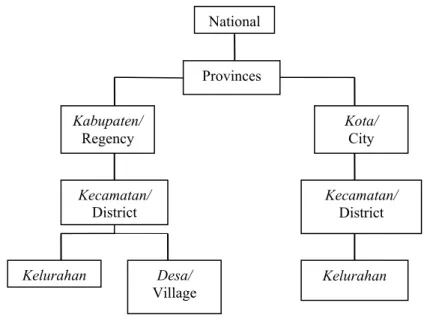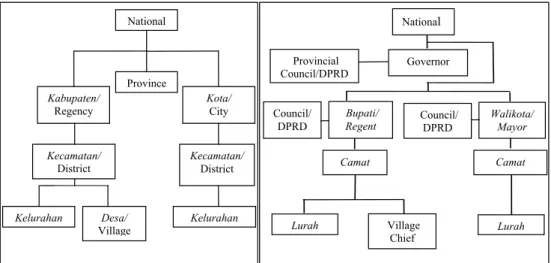This article is an examination of the implementation of the United Nations Framework Convention on Climate Change (UNFCCC) as a Multilateral Environmental Agreement (MEA) in Indonesia. The above words of Barbossa cynically but accurately describe the position of the United Nations Framework Convention on Climate Change (UNFCCC/Convention) in the context of Indonesia's decentralization. Although Indonesia is a party to the Convention, the Multilateral Environmental Agreement (MEA) cannot automatically bind lower government units, provincial and local governments, as they are not involved in climate negotiations (although they bear the burden of implementing the Convention). .
38/2008 as an instrument of transformation, but not domestic measures for the implementation of the Charter. Even Indonesia's ratification of the Kyoto Protocol does not improve the character of the convention.
The Background to Indonesia’s Decentralisation
The policy introduced by the department will reflect sectoral policies and regulations, as the constitution ensures that each of the ministries is responsible for certain areas of management.60 This situation causes uncoordinated policies and regulations, which increases the possibility of contradictions between these policies. or regulations. Accordingly, while these initiatives demonstrate the national government's commitment to climate efforts under the Convention, they face other domestic challenges, particularly in relation to coordination between different sectors. These challenges suggest that even if the Convention faces coordination challenges at the national level, more challenges will arise when dealing with lower government units in the context of decentralization.
As a result of decentralization, the national government faces difficulties in directing lower government units to comply legally and politically with the rules of the Treaty. People from areas that contributed significantly to Indonesia's economy, such as Aceh, Papua, Riau, Kalimantan and other areas, were not satisfied with national government policies. The natural resources in these areas were extensively exploited, but the benefits of the resources did not contribute significantly to the economy in these areas.65.
After the fall of the Suharto regime, many regions with valuable natural resources demanded a greater role in the management of their local affairs and a larger share of the income from their natural resources.66 The freedom movements that took place in different parts of Indonesia created new democratic pressures The national government hoped that power-sharing would lessen separatist sentiment.68 The social and political problems caused by economic inequality were exacerbated by the 1997 Asian economic crisis. Lindsey argues that the inability of the New Order regime to provide transparent and predictable governance has contributed to the catastrophic magnitude of Indonesia's economic crisis. The extraordinary political circumstances following the economic crisis resulted in the fall of the Suharto regime in 1998, which helped bring about decentralization efforts.69.
Amidst this social, economic and political background of decentralization, the Convention's reliance on political support creates challenges.
Indonesia’s Decentralisation Model: Institutional Arrangement The institutional set-up and sharing of authority in Indonesia’s
The governors, elected in each province, have a dual function.70 They not only act as heads of their autonomous regions, but also maintain a hierarchical relationship with the central government.71 In the latter position, they are considered agents of the government. national. who coordinate local government policies. Some argue that by focusing on local governments, the national government benefits because national government bureaucrats have greater influence, compared to the influence of provincial governments, over local governments.73. 72 United Nations Development Program (UNDP) Indonesia, “The Missing Link: The Province and Its Roles in Indonesia's Decentralization”, (May 2009) 5, Policy Paper, p.
The original law on decentralization after the fall of the Soeharto regime (Law No. 22/1999) divided government power only on the basis of administrative boundaries. Division of powers between different levels of government Decentralization reform requires the division of powers between different levels of government. With the exception of six excluded bodies83, the rest of the bodies are autonomous from lower state bodies.
The local/city governments have most of the policy implementation power, such as dealing with the monitoring of mining activities and environmental assessments.91 Essentially, the introduction of the new decentralization laws has attempted to change the role of the administrative boundary system in determining the sharing of government authority between different levels of government. In sectoral laws and regulations, both statutory provisions and administrative boundaries are used to determine the division of authority. 91 Government Regulations 2007 38 (Indonesia) on the division of powers between the national provincial and local/city governments, p.
92 Government Regulation 2007 38 (Indonesia) on the Division of Powers between National, Provincial and Local Governments, Forestry Sector Annex AA, Number 34.

The Effects of Decentralisation on the Forestry Sector
As a result, the specific authority of different levels of government over a range of sectors will depend on sectoral laws and regulations, not simply on the decentralization regime. This may increase the possibility of conflicting policies and interpretations regarding the authority of different levels of government. In natural resource management, these optional authorities are critical as national, provincial and local governments share their authorities.103 Although the Decentralization Act attempts to limit the flexibility of optional authorities by introducing a requirement to refer to laws and regulations, the different interpretations of optional authority may still appear.
For example, a regent (the head of a Kabupaten or regency), may see the potential of a natural resource in a region and decide to invest in it. Rusli and Duke suggest that decentralization meets the demands of the provincial and local governments to obtain income from natural resources. Indonesia's decentralization facilitates their desires to implement their decentralized authority.� McCarthy recommends that local governments adopt a regulatory system that uses the national legal system "creatively" for local benefits.�.
Treaty and Lower Government Units
The Burdens of Decentralisation
International Political Arrangement Generates Burdens
These burdens are related to coordination difficulties, legality issues and challenges related to Indonesia's social and political background. Conversely, problems can arise when an international agreement involves the division of powers between different levels of government, as in the case of the Climate Change Convention. While Indonesia became a party to the convention, lower government units committed to actions that contribute to Indonesia's high level of greenhouse gas emissions from deforestation.
For example, Indonesian involvement in the UNFCCC may require the national government to change the authority of the provinces and local government. Yet the exploitation of forests based on the granting of timber concessions by the local government has increased deforestation at an alarming rate. On this point, the action of the local government contradicts the legal obligations of the national government under the Treaty.
Therefore, the regulation of international politics under Indonesia's decentralization may become a burden on the implementation of the UNFCCC. When the fulfillment of an international commitment does not require the commitment of lower units of government, domestic politics is not relevant. In the context of the UNFCCC in Indonesia, although international policy is the exclusive domain of the national government, the national government depends on lower government units to fulfill international commitments.
Coordination Problems
The Convention in Indonesia’s Decentralisation
Having only a soft legal obligation and facing questions of legality in the Indonesian context, political commitments are essential for the effective implementation of the Convention. The Ratifying Acts of the Convention and the Kyoto Protocol are not clear sources of law. The obligation for lower government units to meet the national commitment to the Kyoto Convention and its Protocol is unclear.
Support from lower government units and local actors can facilitate the fulfillment of the national commitment to the Convention. After the fall of the Soeharto regime, local actors perceived it as the time for them to get their share of the benefits associated with forest resources.158. Authority over international politics under decentralization, which is exclusively the domain of the national government, negates the importance of local politics in the implementation of the Convention.
The denial of local politics can also reduce the legitimacy of national commitment to the Convention, given that the participation of local actors is not possible. The request to submit an annual report to the COP Convention can, for example, be implemented by a ministry at the national level. However, when Indonesia wants to implement measures that directly involve the political dynamics of the regions, for example in limiting the use of forest resources, the cooperation of the regions is necessary before the conclusion of an international agreement.
The legal and political issues have mixed and marked the implementation of the Treaty in Indonesia's decentralization.
Conclusion
Bertrand, Jacques, "Indonesiens kvasi-føderalistiske tilgang: Accommodation amid Strong Integrationist Tendencies International Journal of Constitutional Law, 576. Birnie, Patricia, Boyle, Alan og Redgwell, Catherine International Law and the Environment (Oxford University Press, New York, 2009) . Brunnée, Jutta, "COPing with Consent: Law-Making under Multilateral Environmental Agreements Leiden Journal of International Law (LJIL).
Butt, Simon, "Regional Autonomy and Legal Disorder: The Spread of Local Laws in Indonesia" (2010) Singapore Journal of Legal Studies. Indonesian Ministry of Environment Rencana Aksi Nasional Dalam Menghadapi Perubahan Iklim (Ministry of Environment, Jakarta, 2007). SMERU, "Indonesia's Decentralization Policy: initial experiences and emerging issues" (a paper prepared for the third panel of the EUROSEAS Conference on Decentralization and Democratization in Southeast Asia, September 2001).
United Nations Development Program (UNDP) Indonesia, “The Missing Link: The Province and Its Role in Indonesia's Decentralization,” (May 2009) 5, Policy Paper. Usui, Norio and Alisjahbana, Armida "Local Development Planning and Budgeting in Decentralized Indonesia: An Update" (Paper presented at the International Symposium on Indonesian Decentralization Policy: Issues and Policy Directions, 4-5 September 2003). Warnock, Ailsa Ceri, “The Climate Change Regime: Effectiveness, Compliance and Enforcement” (2004) 8 New Zealand Journal of Environmental Law, 99.
United Nations Framework Convention on Climate Change (opened for signature 20 June 1992, entered into force 21 March 1994).
